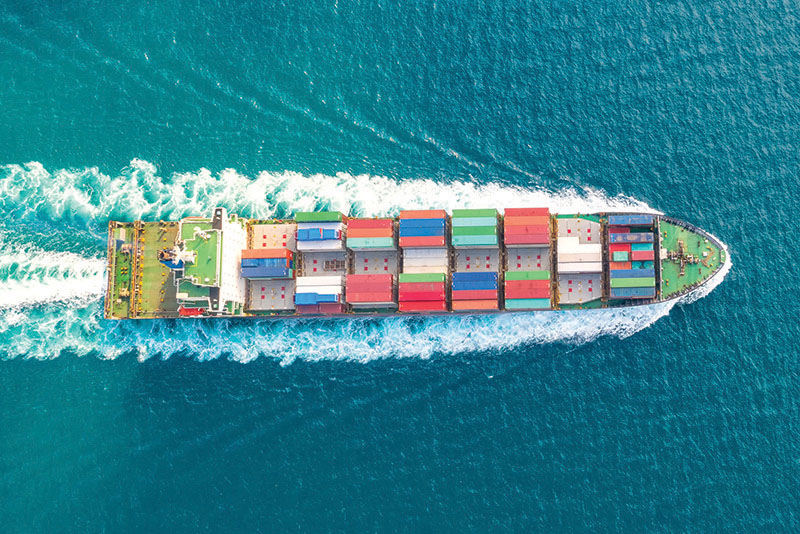2M ocean alliance is winding down, reports MSC and Maersk
Last week, global ocean container carriers Geneva Switzerland-based MSC Shipping Company (MSC) and Copenhagen, Denmark-based Maersk A/S, a subsidiary of A.P. Moller-Maersk, said that they have reached a mutual agreement to terminate their 2M ocean alliance, a container shipping line vessel agreement in 2025.
The alliance was established in 2015, with Maersk and MSC focused on ensuring competitive and cost-efficient operations on the Asia-Europe, Transatlantic, and Transpacific trade lanes. The 2M alliance is comprised of a minimum term of 10 years and includes a two-year notice of termination.
“MSC and Maersk recognize that much has changed since the two companies signed the 10-year agreement in 2015. Discontinuing the 2M alliance paves the way for both companies to continue to pursue their individual strategies,” said, Vincent Clerc, CEO of A. P. Moller - Maersk, and Soren Toft, CEO of MSC, in a joint statement. “We have very much appreciated the partnership and look forward to a continued strong collaboration throughout the remainder of the agreement period. We remain fully committed to delivering on the 2M alliance’s services to customers of MSC and Maersk. [This] announcement has no immediate impact on the services provided to customers using the 2M trades. Each company’s customer teams will communicate with their respective clients to support during, and beyond, the phase-out of the 2M alliance.”
LM previously reported that the 2M alliance had “dominated” the Asia-EU trade lanes with almost 35% of market share.
In October 2014, the United States Federal Maritime Commission (FMC) signed off on a vessel sharing agreement (VSA) Maersk and MSC to launch the 2M alliance.
FMC officials said at that time that that the organization concluded its review of the proposed VSA, which included the evaluation of information received from Maersk and MSC on response to questions from the FMC staff and Commissioner during the review period. It added that the agreement would authorize the carriers to share vessels and engage in related cooperative operating activities in trade lanes between the U.SD. and Asia, North Europe and the Mediterranean.
Maersk and MSC first announced the 2M Network in July 2014, explaining it is a ten-year VSA that has an estimated capacity of 2.1 million TEU (Twenty-Foot Equivalent Units) or roughly 185 vessels, with Maersk contributing about 55 percent of its capacity.
Independent supply chain analyst Chris Rogers told LM that the split between Maersk and MSC indicates a divergence in strategies.
“MSC appears focused on the quantity of market share, building a significantly larger fleet. Maersk appears focused on deeper relations, preferring a focus on fully integrated services,” he said. “That would lead the two firms to have different priorities for route choices, especially in down-markets where Maersk might prefer to deprioritize routes that MSC would want to keep. The impact of the split probably won’t be felt until the 2024 contracting period at the earliest, given most shippers prefer shorter-term deals in the current declining rate environment. Both parties may pursue other, more limited alliances to add flexibility. For example, ZIM has previously routed alongside 2M and could be a partner for either, or both. The cross-alliance route offerings already in place, e.g. the CMA CGM - MSC arrangement from 2019 and the HMM-2M slot sharing deal.”
Ben Hackett, founder of maritime consultancy Hackett Associates, said he was surprised it took so long and that it actually appears to be running its contractual term.
“Two companies with significantly different strategies, one a Swiss company with a Danish CEO and the other a Danish company with a Swiss CEO. Maersk wants to do factory gate to wholesale door, i.e. acting as a complete integrator, which will set it up for opposition from 3PLs,” he said. “This has been tried in the past by various carriers, with not much success as the market reacts and sees an intruder in their business. The real danger is losing focus on the main goal, the shipping line trying to fill its capacity. MSC wants to cover the world with its ships and as we know they only had about a quarter of their ships in 2M. The challenge for Maersk is that it does not have enough ships to run a completely independent service, so it will need to be enter into slot charter arrangements whilst MSC has kept its focus on covering as many trades as possible with its vessels outside of 2M. Their strategy has always been to have a variety of ships, including smaller, low-priced ones that can be competitive on the lower volume trade routes which are seeing the most growth. It Could turn into a bit of a freight/market share war which is not alien to MSC.
Interesting times ahead. My money is on MSC.”













